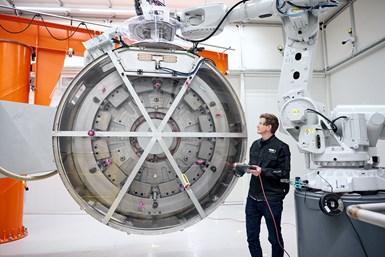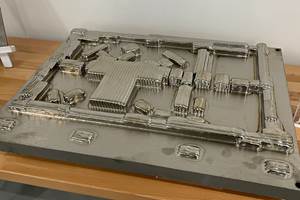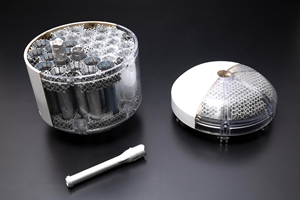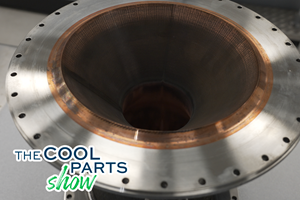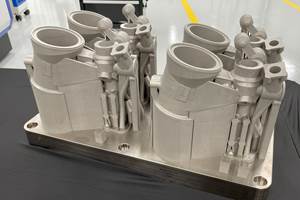GKN Aerospace Invests £50 Million to Grow Sustainable Additive Fabrication Capability
The investment will establish a Center of Excellence in Trollhättan, Sweden, which the company will use to accelerate and scale up production of the groundbreaking technology.
GKN Aerospace is boosting its commitment to sustainable manufacturing with a £50 million (600 million SEK) investment in its cutting-edge additive fabrication technology in Trollhättan, Sweden. The Swedish Energy Agency’s Industriklivet initiative will fund £12 million (152 million SEK) of this investment, which the company says will help to revolutionize production methods by reducing raw material usage by up to 80%. The technology will be embedded at GKN Aerospace’s Trollhättan facility in Sweden, which will be operational later in 2024.
Currently, aircraft engine components rely on large castings and forgings, with up to 80% of the material machined away before reaching the final form. By employing additive technology, which involves layer-by-layer construction using metal wire or powder fused together with lasers, GKN Aerospace is able to minimize raw material waste, energy use and shipping within production. This significantly cuts emissions, costs and lead time.
GKN Aerospace says it has been at the forefront of additive fabrication for almost two decades, and has significant research and technology centers in Sweden, the UK and the U.S. Thanks to the backing from Industriklivet, the new additive production center in Sweden is projected to create around 150 new job opportunities for operators, technicians and engineers at the Trollhättan facility.
“We are committed to driving sustainability in the aviation industry and pioneering improved solutions for our customers,” says Joakim Andersson, president of GKN Aerospace’s Engines business. “Our development of additive fabrication for large, complex and load-bearing aircraft components is a great example of this and it marks a significant breakthrough for the industry.”
The company says the benefits it sees from this technology are truly game-changing. “Government support has been pivotal in enabling us to push our capabilities forward and I am delighted to establish this unique technology in our world-leading facility in Trollhättan Sweden,” Andersson adds.
“GKN Aerospace’s solution will be able to contribute to a reduced use of raw materials and create opportunities to fundamentally change the design, making the aircraft engine lighter and more efficient. “This is the first time this technology is being tested for this component size and we see the potential for it to spread globally and also in other areas,” says Peter Engdahl, head of Research, Innovation and Business Development at the Swedish Energy Agency.
Last summer, the company relocated its North America AM center of excellence to Fort Worth, Texas. The move included a larger facility, plans for an additional larger AM cell and increased collaboration within the aerospace ecosystem.
GKN Aerospace serves some of the world’s leading aircraft manufacturers, as it designs, manufactures and delivers an extensive range of advanced aerospace systems, components and technologies — for use in commercial and defense aircraft ranging from helicopters, business jets, passenger planes and advanced air mobility vehicles to advanced fighter aircraft.
In line with its mission, GKN Aerospace is committed to achieving net-zero emissions by 2050. Lightweight composites, additive manufacturing, electrical wiring interconnection systems and innovative engine systems help to reduce emissions and weight on today’s aircraft, while it collaborates with global partners to accelerate the development of zero-emission aircraft technologies, including hydrogen-powered propulsion and all-electric flight.
Related Content
How Norsk Titanium Is Scaling Up AM Production — and Employment — in New York State
New opportunities for part production via the company’s forging-like additive process are coming from the aerospace industry as well as a different sector, the semiconductor industry.
Read More3D Printed Lattice for Mars Sample Return Crash Landing: The Cool Parts Show Bonus
NASA Jet Propulsion Laboratory employs laser powder bed fusion additive manufacturing plus chemical etching to create strong, lightweight lattice structures optimized to protect rock samples from Mars during their violent arrival on earth.
Read More3D Printed NASA Thrust Chamber Assembly Combines Two Metal Processes: The Cool Parts Show #71
Laser powder bed fusion and directed energy deposition combine for an integrated multimetal rocket propulsion system that will save cost and time for NASA. The Cool Parts Show visits NASA’s Marshall Space Flight Center.
Read MoreWhy AM Leads to Internal Production for Collins Aerospace (Includes Video)
A new Charlotte-area center will provide additive manufacturing expertise and production capacity for Collins business units based across the country, allowing the company to guard proprietary design and process details that are often part of AM.
Read MoreRead Next
Postprocessing Steps and Costs for Metal 3D Printing
When your metal part is done 3D printing, you just pull it out of the machine and start using it, right? Not exactly.
Read MoreAlquist 3D Looks Toward a Carbon-Sequestering Future with 3D Printed Infrastructure
The Colorado startup aims to reduce the carbon footprint of new buildings, homes and city infrastructure with robotic 3D printing and a specialized geopolymer material.
Read MoreProfilometry-Based Indentation Plastometry (PIP) as an Alternative to Standard Tensile Testing
UK-based Plastometrex offers a benchtop testing device utilizing PIP to quickly and easily analyze the yield strength, tensile strength and uniform elongation of samples and even printed parts. The solution is particularly useful for additive manufacturing.
Read More




